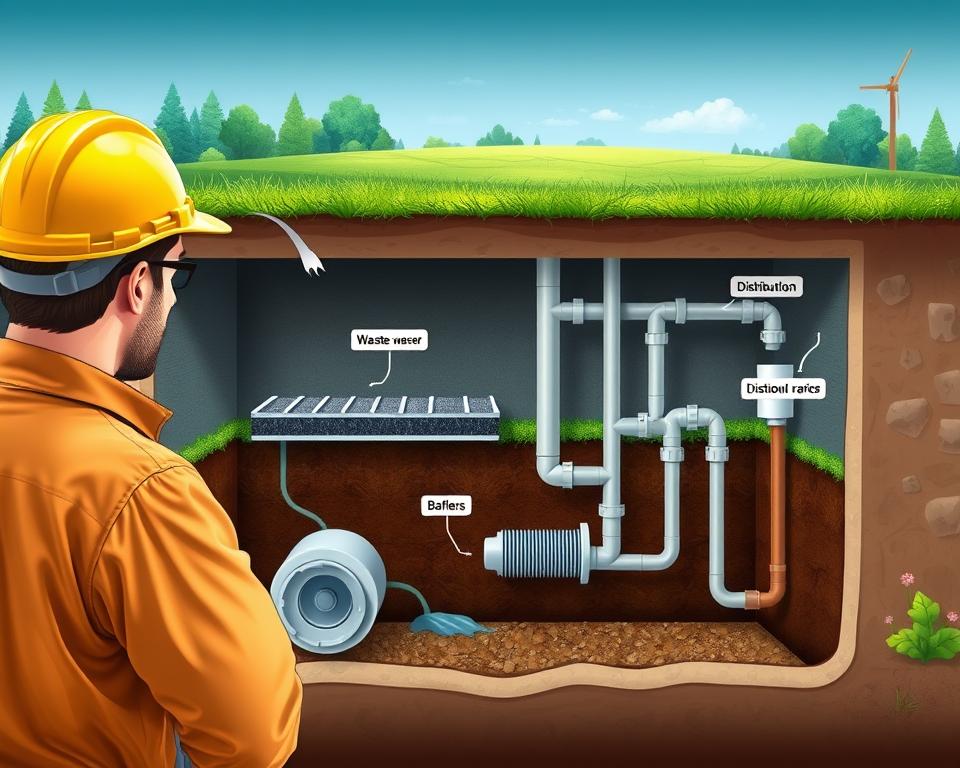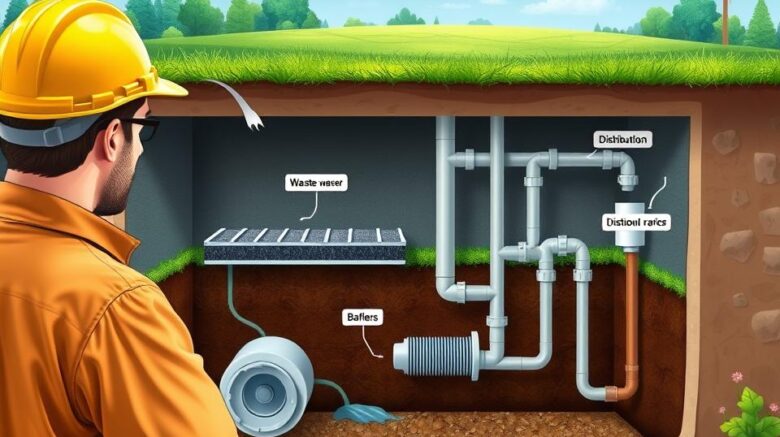Cleaning a Septic System: Protect Your Tank Condition
Have you ever wondered concerning the ramifications of neglecting septic system care? For those who use these units for waste management, foregoing routine care can cause significant bills. It also creates hazards to both health and the ecosystem. Cleaning your septic system is more than a simple task; it’s crucial for ensuring your household runs efficiently. By consistently emptying your septic tank, you halt sludge build‑up and lengthen the lifespan of your setup. This preventive approach lets you avoid any troublesome scenarios. Learn the importance of septic tank maintenance and the methods required with septic pumping companies near me.
Critical Points
- Scheduled septic system pumping is vital for avoiding costly repairs.
- Neglecting upkeep can lead to dangerous conditions for your loved ones.
- Knowing your septic system helps in proper stewardship.
- Symptoms of a troubled septic system should be noticed early.
- Licensed technicians can support in keeping peak tank health.
Comprehending Your Septic System
A septic system is an effective onsite solution for handling wastewater. It mainly includes two sections: the septic tank and the drainfield. Both are integral for providing proper sanitation and safeguarding the surroundings.
The septic tank collects wastewater from your home. There, solid particles settle to the bottom, and effluent float to the upper layer. Bacteria within the tank digest the organic material, making the outflow more manageable to handle. This initially processed wastewater then moves to the absorption area for additional filtering by the ground, concluding the cycle.
It’s crucial for homeowners to understand the dynamics of their septic system. Knowing how the septic tank and drainfield function in tandem can foster enhanced system care. This understanding encourages effective maintenance methods, supporting the system’s robustness.

Importance of Routine Septic System Cleaning
Routine servicing of the septic system is key for home and ecological health. If overlooked, untreated wastewater can leak into your yard. This overflow might lead to groundwater contamination, creating health risks. By keeping the septic system clean, you safeguard your family and the environment.
It’s recommended to service the septic system every three to five years, according to how much you rely on it. Such maintenance is not just good for the planet; it avoids costly fixes. A septic system that’s properly cared for operates better, delivering a cleaner living space and a cleaner ecosystem.
Indicators Your Septic Tank Needs Service
Homeowners need to recognize clues that their septic tank may need pumping. Common indicators to watch for are:
- Delayed water flow in basins, showers, and toilets
- Bad smells near the drainfield
- Effluent backups in indoor pipes
- Prolonged wet areas or overly green patches of grass on top of the septic system
It’s critical to recognize these signs promptly to avert major septic tank failures. Regular inspections are essential. They help spot issues before they turn into expensive fixes. Examining your system periodically ensures it functions well and lasts longer.
Being mindful and acting swiftly are essential for septic system upkeep. By paying close attention to these alerts, you can keep your septic system in optimal health.
Septic System Pumping Schedule
Pumping your septic system consistently is key to keeping your home’s plumbing in excellent condition. Experts generally recommend servicing the septic tank every three to five years. However, this can differ according to the capacity of your household, how much usage you have, and the size of your tank.
If you have a big household that uses more water, you may require to clean the system at shorter intervals. Tracking your water usage can let you determine if you need to modify your pumping schedule.
All in Sanitation recommends setting up a reliable pumping schedule that matches your household’s specific needs. Following a routine maintenance routine helps keep your septic system operating effectively and sidesteps hefty restorations.
Septic System Cleaning: Recommended Methods
For a septic system to remain healthy, homeowners must observe important practices. It’s essential not to send down non‑biodegradable items; doing so avoids clogs and maintains the system functioning properly. Similarly, minimizing chemical cleaners helps maintain the necessary bacterial balance. These actions are vital for the system’s longevity and effectiveness.
Proactivity with scheduled inspections is key. Setting up periodic inspections can spot issues promptly, enabling swift fixes. Additionally, conserving water through fixing leaks and conscious usage supports septic tank health. These practices make sure the system functions efficiently for years.
It’s also essential not to place heavy loads on the leachfield. Maintaining this area clear lets it effectively process waste water, protecting your system from damage. Following advice from specialists like All in Sanitation also improves septic system care.
The Procedure of Septic Tank Pumping
For homeowners, grasping the septic system maintenance process is crucial. A licensed septic pumper should conduct routine septic tank pumping to keep your system operating properly. The first step is assessing the tank’s state to see when it needs pumping.
A septic tank needs pumping once the solid layer occupy about 1/3 to one‑half of its space. The licensed septic pumper will then remove these deposits. This action preserves the system’s efficiency. Furthermore, the service may include inspecting the tank for possible issues, enabling prompt fixes.
Maintaining a journal of each pumping visit is smart. This log lets owners monitor their septic system’s maintenance, and is valuable if listing the property. Regular septic system maintenance improves its service life and functionality, averting costly fixes later on.
Septic Tank Check‑Up: What to Watch For
Scheduled inspections are vital for your septic system’s condition. Using a detailed septic tank inspection checklist can detect potential issues before they worsen. Inspections should be carried out by a certified professional every one‑to‑two years. They will assess solid depth and the floating layer during this time.
Checking the baffles and outflow filters is also vital. These elements are key for your septic system’s smooth performance. Finding seepage or malfunctions quickly can avoid large repair costs. Proactive steps, like using an inspection checklist, enhance your system’s durability and efficiency.
Professional Septic System Services
Utilizing expert septic system services is essential for your septic system’s health. By selecting a company like All in Sanitation, you guarantee that skilled technicians take care of the cleaning, inspections, and repairs carefully. Certified experts possess specialized knowledge, allowing homeowners to keep the system’s optimal functionality long‑term.
Servicing by qualified pros reduces the likelihood of sudden breakdowns and costly fixes. These services include detailed inspections that check the system’s status, identifying potential issues before they escalate. Maintaining this proactive stance significantly prolongs your septic system’s service years.
In the end, delegating your septic system to licensed professionals offers confidence. Collaborating with companies such as All in Sanitation utilizes their experience. It guarantees the integrity of your tank, creating trust in its maintenance.
Septic System Maintenance Tips for Homeowners
Homeowners have the capacity to maintain their septic systems running reliably. Using efficient care strategies significantly improves their performance. Making simple tweaks to how we use water, like limiting unnecessary use and staggering the use of appliances, lessens strain on the system.
Installing efficient fixtures in your bathrooms and kitchens significantly helps septic durability. These fixtures decrease water use without hurting performance. Avoiding garbage disposals is smart too, as they produce more waste in the system, demanding increased upkeep.
Regular inspections and adhering to a proper maintenance plan will extend your septic system’s service. Paying attention of everything that flows into your drains is essential for keeping a balanced septic environment. By adopting these tips, you’ll immensely boost your septic system’s operation and durability.
Common Septic System Fixes
Septic systems may encounter various problems over time, necessitating repairs. Frequent concerns include leaks, faulty baffles, and percolation troubles in the leachfield. By recognizing the signs early, homeowners can resolve them rapidly, ensuring their system remains in solid condition.
Usual repairs consist of:
- Replacing faulty components to restore system integrity
- Fixing or substituting broken lines to prevent leaks
- Removing obstructions from blocked pipes to maintain proper drainage
Addressing septic issues quickly not only reduces expenses over time but also lengthens the system’s life. Routine check‑ups and maintenance can help prevent these issues, supporting the upkeep of a healthy septic system.
Final Thoughts
Maintaining your septic system healthy is central to environmental and personal well‑being. Consistent cleanings and check‑ups prevent hefty bills and dangers. Taking initiative with septic care conserves time and reduces concern.
Employing specialists like All in Sanitation delivers first‑class upkeep suited to your system. Their experience aids catch issues quickly, preventing serious troubles and emphasizing the need for routine inspections.
Following sound methods for septic maintenance promises long‑term system efficiency. A little maintenance today secures a better‑functioning septic system in the future.
